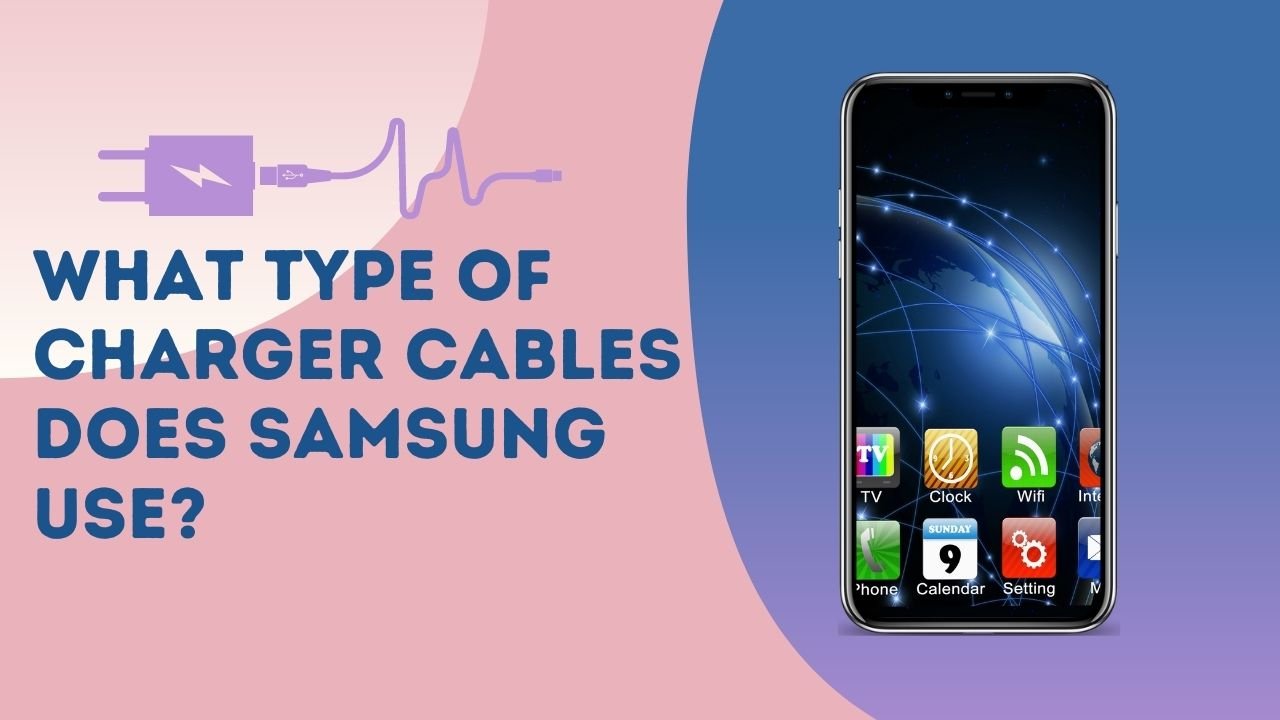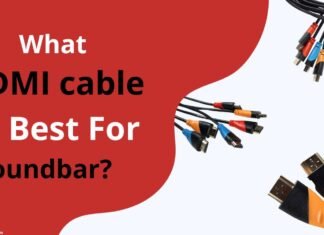Samsung Galaxy devices are renowned for their cutting-edge technology and versatile features.
However, understanding what type of charger cables they use is crucial for ensuring your devices stay powered and perform optimally. In this guide, we’ll explore the types of charger cables Samsung uses, their benefits, and how to choose the right one for your needs.
Types of Charger Cables Used by Samsung:
Short Answer
Most Samsung smartphones use either USB Type C or Micro USB charger cables. USB-C is now the standard for newer models, while Micro-USB was common in older devices.
Types of charger cables
Charger Type Comparison Table for Samsung Devices
| Feature | Micro-USB | USB-C | Wireless |
|---|---|---|---|
| Connector Type | Flat, rectangular, one orientation | Slim, oval, reversible | No physical connection |
| Pros | Widely available, fits older devices | Fast charging, reversible, slim | Convenient, no cables needed |
| Cons | Slow charging, fragile, limited data | Not universal, needs a charging pad | Slower than wired, needs precise placement |
| Compatibility | Older Samsung devices (pre-2016) | Newer Samsung devices (post-2016) | Samsung devices with Qi support |
| Data Transfer Speed | Up to 480 Mbps (USB 2.0) | Up to 10 Gbps (USB 3.2) | Not applicable |
| Charging Speed | Standard, not fast | Fast charging (AFC, SFC) | Slower than wired fast charging |
Additional Notes
- Micro-USB is becoming obsolete with the rise of USB-C.
- USB-C supports video output and high-speed data transfer.
- Wireless charging is less efficient but offers convenience.
- Qi is the common standard for wireless charging.
If you’re juggling multiple devices or dealing with an aging charger, knowing which type to use is essential. Here’s a breakdown of Samsung’s charger cable options:

But you also don’t want to risk your phone dying on you while you’re on vacation or in the middle of an important meeting—which is why it’s important to have a good charger around.
Mini-USB Phone Charger
What It Is: An earlier connector used before 2010. Slightly larger than Micro-USB.
Technical Specifications:
- Pins: 5
- Data Transfer Speed: USB 1.1 and 2.0 up to 480 Mbps
- Power Output: Lower compared to Micro-USB
Micro-USB Charger
What It Is: A small, rectangular connector used in many Samsung phones from 2010 to 2016.
Technical Specifications:
- Pins: 5
- Data Transfer Speed: USB 2.0 up to 480 Mbps
- Power Output: Generally used for charging, not fast charging
USB-C Phone Charger
The Switch: Samsung started using USB-C around 2016, providing several advantages over Micro-USB.
Benefits:
- Faster Charging: Supports various fast charging protocols
- Reversible Plug: Can be inserted in any orientation
- Higher Data Transfer Speed: Supports USB 3.1 and later versions
- Slimmer Design
Versions: While different versions of USB-C exist, standard USB-C cables work for most charging needs.
Wireless Charging
Technology: Uses electromagnetic induction to charge devices without cables.
Compatibility: Available on many flagship and some mid-range Samsung models.
Standards: Samsung utilizes the Qi standard, compatible with various wireless charging pads.
Latest Fast-Charging Technology
45W Super Fast Charging: Reduces charging time significantly. Found in newer flagship models like the Galaxy S22 Ultra and S23 Ultra.
Requirements: Requires a compatible USB-C charger and cable that can handle higher wattage.
Choosing the Right Charger for Your Samsung Smartphone
Fast Charging Support: Check if your phone supports fast charging. Most models from the S and Note series from 2019 onwards do.
Cable Type: Match the cable type with your device’s connector. Use USB-C for newer models and Micro-USB for older ones.
Types of Fast Charging Technologies
| Charging Technology | Speed | Convenience |
|---|---|---|
| Adaptive Fast Charging (AFC) | Up to 50% in 30 minutes | Requires a wired charger |
| Super Fast Charging (SFC) | Up to 100% in 60 minutes | Requires a wired charger |
| Wireless Fast Charging | Up to 15W | Requires a wireless charger |
Adaptive Fast Charging (AFC): Charges up to 40% in 30 minutes. Ideal for a quick power boost.
Super Fast Charging (SFC): Charges up to 60% in 30 minutes. Best for those needing rapid charging.
Wireless Fast Charging: Provides up to 15W of power. Perfect for those who prefer wireless convenience.
Best Practice for Charging
Best Practices for Charging Your Samsung Device
Complete Charges: Always let your device charge fully. This helps maintain battery health.
Use Proper Chargers: Stick to the original or certified chargers to avoid damaging your device.
Unplug When Full: Prevent overcharging by unplugging once your device reaches 100%.
Avoid Overnight Charging: Minimize strain on the battery by not leaving it plugged in overnight.
Cable Types that the Latest Samsung Device supports
Devices that use a USB Type C Charger
| Type of Phone | Type of Charger |
| Samsung Galaxy S8 | Type C |
| Samsung Galaxy S8+ | Type C |
| Samsung Galaxy S8 Active | Type C |
| Samsung Galaxy S9 | Type C |
| Samsung Galaxy S9+ | Type C |
| Samsung Galaxy S Light Luxury | Type C |
| Samsung Galaxy S10 | Type C |
| Samsung Galaxy S10+ | Type C |
| Samsung Galaxy S10e | Type C |
| Samsung Galaxy S20 | Type C |
| Samsung Galaxy S20+ | Type C |
| Samsung Galaxy S20 Ultra 5G | Type C |
| Samsung Galaxy S20 5G | Type C |
| Samsung Galaxy S20+ 5G | Type C |
| Samsung Galaxy S20 FE | Type C |
| Samsung Galaxy S21 5G | Type C |
| Samsung Galaxy S21+ 5G | Type C |
| Samsung Galaxy S21 Ultra 5G | Type C |
| Samsung Galaxy S22 | Type C |
| Samsung Galaxy S22+ | Type C |
| Samsung Galaxy S22 Ultra 5G | Type C |
Devices that use a Micro USB Charger
Devices like Samsung J7 & many more from the list support micro USB charging type.
| Type of Phone | Type of Charger |
| Samsung Galaxy S | Micro USB |
| Samsung Galaxy S Plus | Micro USB |
| Samsung Galaxy S2 Skyrocket | Micro USB |
| Samsung Galaxy S3 | Micro USB |
| Samsung Galaxy S3 Mini | Micro USB |
| Samsung Galaxy S2 Plus | Micro USB |
| Samsung Galaxy S4 | Micro USB |
| Samsung Galaxy S4 Active | Micro USB |
| Samsung Galaxy S4 Mini | Micro USB |
| Samsung Galaxy S5 | Micro USB |
| Samsung Galaxy S5 Active | Micro USB |
| Samsung Galaxy S5 Sport | Micro USB |
| Samsung Galaxy S5 Mini | Micro USB |
| Samsung Galaxy S5 Plus | Micro USB |
| Samsung Galaxy S6 | Micro USB |
| Samsung Galaxy S6 Edge | Micro USB |
| Samsung Galaxy S6 Active | Micro USB |
| Samsung Galaxy S6 Edge+ | Micro USB |
| Samsung Galaxy S7 | Micro USB |
| Samsung Galaxy S7 Edge | Micro USB |
Best Charger to Buy for Samsung device
45W USB-C wall charger
The USB C PD PPS(Programmable Power Supply) protocol provides 45W Super Fast Charging. The charger itself is compact, which makes it highly portable. Compatible with the majority of Samsung smartphones like S50, A12, and A03S.
Anker Wireless Charger
A high-efficiency chipset provides 10W high-speed charging for Samsung Galaxy. iPhones get a boosted 5W charge at 10% faster than other wireless chargers.
SAMSUNG 15W Wireless Charger Duo w/ USB C Cable
Thanks to up to 15W of fast wireless charging support, get the charge you need. This charger boost is compatible with USB PD and Super Fast Charging travel adapters for an easy pick-me-up.
Samsung USB-C Super Fast Charging Wall Charger
This charger delivers up to 3 amps, so you can quickly and easily power up your phone without waiting long periods of time. The detachable USB-C to USB-C cable is included so that you can use it with any other charging source.
Samsung Qi Certified Fast Charge Wireless Charger
The Samsung Fast Charge Wireless Charger Stand is exactly what it says it is: a charging stand that charges smartphones that support Qi. For Samsung Galaxy devices, the maximum output is 9W, compared to 7.5W for iPhones.
The Final Words
Understanding the type of charger your Samsung device uses is crucial for maintaining optimal performance. With this guide, you can make an informed choice, whether you need a traditional cable or are considering wireless options.
Ensure you choose the right charger to match your device’s specifications and enjoy hassle-free power-ups.















